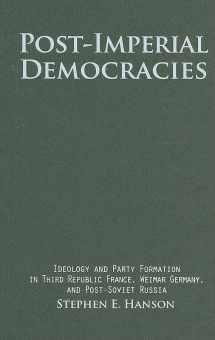
Post-Imperial Democracies: Ideology and Party Formation in Third Republic France, Weimar Germany, and Post-Soviet Russia (Cambridge Studies in Comparative Politics)
ISBN-13:
9780521883511
ISBN-10:
0521883512
Edition:
1
Author:
Stephen E. Hanson
Publication date:
2010
Publisher:
Cambridge University Press
Format:
Hardcover
306 pages
FREE US shipping
Book details
ISBN-13:
9780521883511
ISBN-10:
0521883512
Edition:
1
Author:
Stephen E. Hanson
Publication date:
2010
Publisher:
Cambridge University Press
Format:
Hardcover
306 pages
Summary
Post-Imperial Democracies: Ideology and Party Formation in Third Republic France, Weimar Germany, and Post-Soviet Russia (Cambridge Studies in Comparative Politics) (ISBN-13: 9780521883511 and ISBN-10: 0521883512), written by authors
Stephen E. Hanson, was published by Cambridge University Press in 2010.
With an overall rating of 3.9 stars, it's a notable title among other
books. You can easily purchase or rent Post-Imperial Democracies: Ideology and Party Formation in Third Republic France, Weimar Germany, and Post-Soviet Russia (Cambridge Studies in Comparative Politics) (Hardcover) from BooksRun,
along with many other new and used
books
and textbooks.
And, if you're looking to sell your copy, our current buyback offer is $0.45.
Description
This book examines the causal impact of ideology through a comparative-historical analysis of three cases of "post-imperial democracy": the early Third Republic in France (1870-1886); the Weimar Republic in Germany (1918-1934); and post-Soviet Russia (1992-2008). Hanson argues that political ideologies are typically necessary for the mobilization of enduring, independent national party organizations in uncertain democracies. Clear and consistent ideologies can artificially elongate the temporal horizons of their adherents. By presenting an explicit and desirable picture of the political future, successful ideologues induce individuals to embrace a long-run strategy of cooperation with other converts. When enough new converts cooperate in this way, it enables sustained collective action to defend and extend party power. Successful party ideologies thus have the character of self-fulfilling prophecies: by portraying the future polity as one organized to serve the interests of those loyal to specific ideological principles, they help to bring political organizations centered on these principles into being.


We would LOVE it if you could help us and other readers by reviewing the book
Book review

Congratulations! We have received your book review.
{user}
{createdAt}
by {truncated_author}


